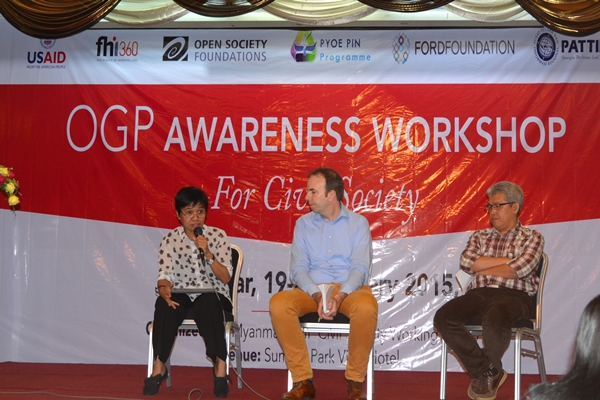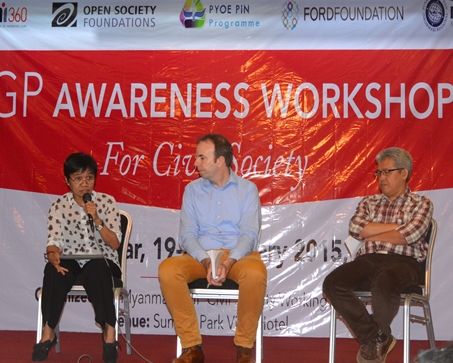#OGPinMyanmar
Background
7 November 2010. Myanmar held a general election for the first time in the last 20 years. Though many appreciated what the government has done, many more people questioned the legitimacy of the election won by the Union Solidarity and Development Party led by General Than Shwe. The General Election Law referring to the 2008 Constitution was considered bias. Many regulations on political party were incriminating which led to resignation of the opposition parties including the National League for Democracy, the main opposition party in Myanmar led by Aung San Suu Kyi.
In the early 2011, less than a year after his winning, Than Shwe stepped down from his position as the number one person in Myanmar. Following the resignation of the General who had been in power for more than 20 years, the military junta in Myanmar was officially dissolved. In 30 March 2011, Thein Shein was appointed as the President of Myanmar replacing General Than Shwe. In his inauguration day, Thein Shein pledged to carry out political and economic reform in Myanmar. Some early changes he did are releasing the political prisoners and letting the opposition parties’ leaders to come back to Myanmar. Moreover, Thein Shein initiated peace negotiation with several Myanmar ethnic groups and revised many incriminating regulation on political party so that the opposition parties could involve in any political activity in Myanmar. The ex-Myanmar Prime Minister in 2007–2011 also decreases government control and censorship over the media. He also gives more space to the people to engage in civil society organization.
After the second general election which was prevailed by the opposition in 2012, the government has become more committed to make changes for the better Myanmar. In November, 2012, the Myanmar Government expressed their intention to join the Open Government Partnership (OGP). The government even expressed their eagerness to fulfil the OGP eligibility criteria so that in 2016 Myanmar could become the part of this multilateral initiative. The civil society also took the initiative. In the OGP Asia Pacific Regional Conference in 2014, the representatives of Myanmar Civil Society Organizations (CSOs) who attended the meeting uttered their willingness to introduce OGP and its platforms and principles to the wider civil society in their country. The enthusiasm to engage in OGP shown by the Myanmar government and civil society received many positive responses from the international.
Follow Up
 19-20 January 2015. As the follow up step of Myanmar CSOs’ intention, supported by Ford Foundation, Open Society Foundation, USAID, fhi360, and Pyoe Pin, Open Government Partnership (OGP) workshop in Myanmar was held. This event is part of the OGP Asia Pacific Outreach collaboratively coordinated by Myanmar Alliance for Transparency and Accountability (MATA), Center for Regional Information and Studies (PATTIRO), Transparency International Indonesia (TII), Indonesian CSO OGP Secretariat, and the OGP Support Unit.
19-20 January 2015. As the follow up step of Myanmar CSOs’ intention, supported by Ford Foundation, Open Society Foundation, USAID, fhi360, and Pyoe Pin, Open Government Partnership (OGP) workshop in Myanmar was held. This event is part of the OGP Asia Pacific Outreach collaboratively coordinated by Myanmar Alliance for Transparency and Accountability (MATA), Center for Regional Information and Studies (PATTIRO), Transparency International Indonesia (TII), Indonesian CSO OGP Secretariat, and the OGP Support Unit.
Taken place in Summit Parkview Hotel, Yangon, the workshop was attended by various delegations from several neighboring countries representing both the government and civil society. Director for Political Affairs and Communication of National Development Planning Agency (BAPPENAS) Raden Siliwanti was present representing Indonesian Government, as well as Derek J. Mitchell, the American Ambassador to Myanmar. Delegation from OGP Support Unit, Paul Maassen, and Civil Society Organisations from Indonesia, the Philippines, Canada and United States also attended the two-day workshop. Hundreds of participants representing various national and sub-national CSOs showed high enthusiasm of Myanmar civil society in taking part in this regional induction.
Even though the government of Myanmar has done several things to improve transparency, yet, as a country which is still in the early stage of reforming process, there are many things Myanmar must do to fulfil the OGP eligibility criteria. However, the American Ambassador to Myanmar, Derek Mitchel strongly suggests both Myanmar government and civil society to not only focus on the goal. “In my view, though, even more important that the goal of open government is the process required to achieve this goal. Note that this program is not called Open Government Initiative or Open Government Processes, but Open Government Partnership because for open government to succeed and thrive, indeed for democracy to succeed and thrive, partnership is essential”, Derek said. He asserts that it is good partnership which makes democracy works.
Partnership. Civil society considers it as one of the factors of Myanmar unpreparedness to join the OGP in 2016. To them, the partnership concept that OGP upheld is yet able to be adopted and implemented in Myanmar. This is because there is no good communication established between the government and civil society. Civil society plead that the government often obstruct their effort to consolidate with each other. This disharmonic relationship between the Myanmar government and its people would make it more difficult for them to establish partnership. It is indeed possible for them to fix this problem, yet, the process would take years.
It is not only about the partnership. Civil society feels that Myanmar participation in OGP is yet become their priority. They argue that the government should have been more focus on amending the 2008 Constitution before the 2015 general election is held. Moreover, the public still need more time to deepen and broaden their knowledge about the OGP issues and principles before they join next year.
Although they are not ready and yet to join the OGP, Myanmar civil society are committed to keep encouraging the government to be more transparent. This is shown from their effort in forming the Freedom of Information Bill and pushing this issue to the government helped by the team from Centre for Law and Democracy.
As a country which had been controlled by the military regime, Indonesia understands how Myanmar civil society feels. Raden Siliwanti, Director for Political Affairs and Communication of BAPPENAS, representing Indonesian government emphasizes that the people of Myanmar has to keep on fighting for the better Myanmar. “Keep moving. Especially for the civil society, no matter how frustrating it could be, please do not quit. Continue the advocacy, conduct research to enrich knowledge, strengthen the network. Do whatever you can do, but stay in the peaceful-nonviolent, democratic tracks”, said Raden Siliwanti in her closing remarks.





